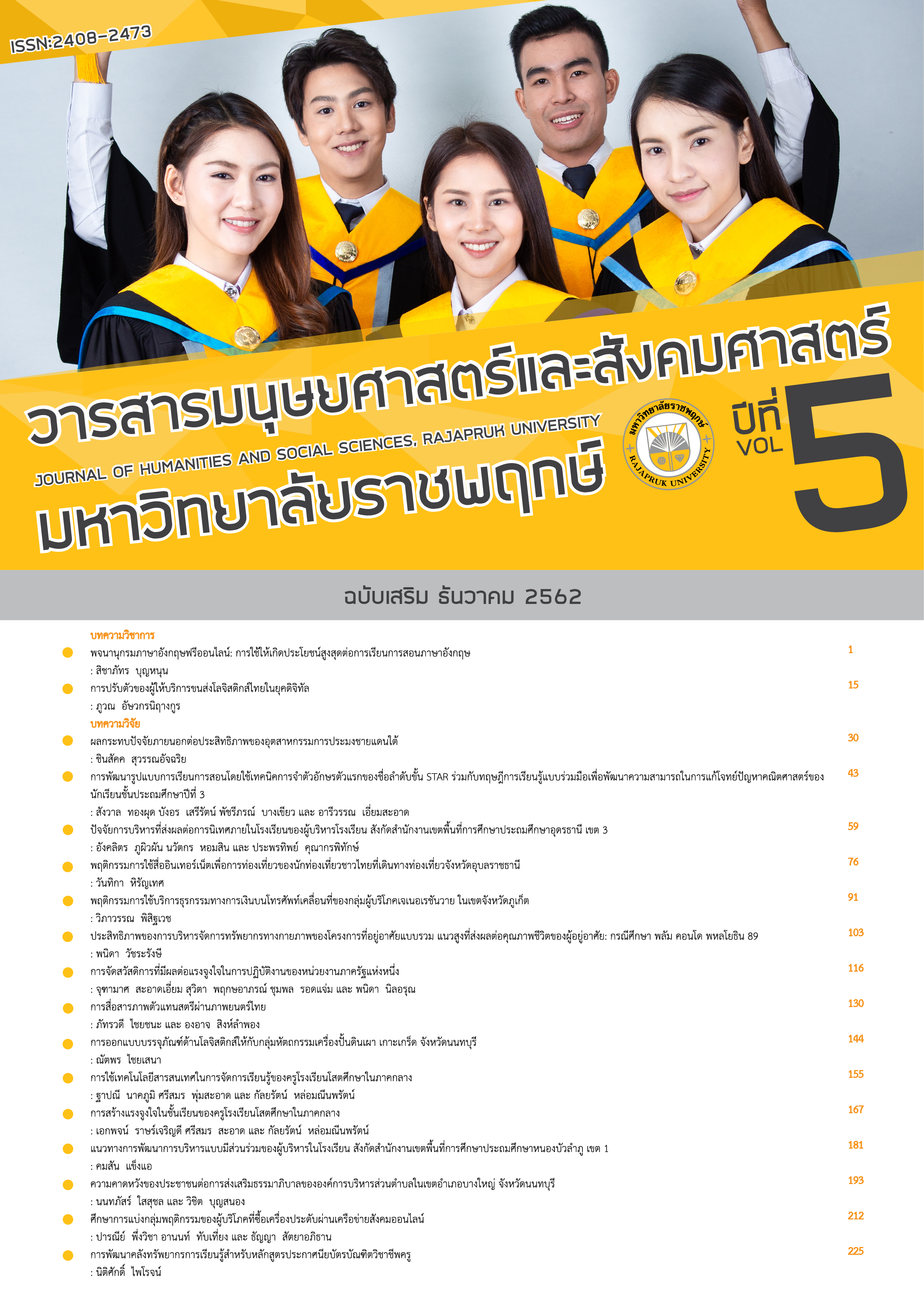Welfare Management that Affects Motivation of a Government Agency
Main Article Content
Abstract
The objectives of this research were to study 1) guidelines for the welfare of employees in government agencies, 2) the opinions of employees in the government agencies on the welfare arrangements, and 3) guidelines for the welfare arrangements that affect the labor force. Motivation for employee performance the researcher chose the research area which is an area within a government organization, collecting data from 30 plan and project division staff. The instrument used in this research was a semi-structured interview form. The results of the research revealed that welfare guidelines can be divided into 4 forms which are (1) self-welfare (2) family welfare (3) capital welfare and (4) flexible welfare. Regarding the opinions of employees in government agencies towards the welfare provided by the employees, it is an attraction to employees' intentions. Very committed to the operation and ways of providing welfare that motivate employees to work more efficiently must come from understanding the true needs of employees.
Article Details
References
เขมจิรา บุตรธิยากลัด และ พนิดา นิลอรุณ. (2560). การบริหารทรัพยากรมนุษย์ที่มีผลต่อความผูกพันในองค์การของพนักงาน กรณีศึกษา บริษัท โตโยต้า โกเซ (ประเทศไทย) จำกัด. วารสารนวัตกรรมและการจัดการ มหาวิทยาลัยราชภัฏสวนสุนันทา. 2(1) (มกราคม-ธันวาคม 2560): 67 - 78.
จุฑามาศ ทันธิกุล และ ชลภัสสรณ์ สิทธิวรงค์ชัย. (2560). ปัจจัยที่มีผลต่อความผูกพันของพนักงานที่มีต่อองค์กรของบริษัท การ์เมนท์ จำกัด. วารสารนวัตกรรมและการจัดการ มหาวิทยาลัยราชภัฏสวนสุนันทา. 2(1) (มกราคม - ธันวาคม 2560): 54 - 66.
จุฑามาศ สงวนทรัพย์ และ กัญญานันท์ อนันต์มานะ. (2560). ความสัมพันธ์ระหว่างความสุขในการทำงานกับความผูกพันต่อองค์กรของพนักงาน กรณีศึกษา บริษัท ดอยคำผลิตภัณฑ์อาหาร จำกัด สำนักงานใหญ่ (ราชเทวี). วารสารนวัตกรรมและการจัดการ มหาวิทยาลัยราชภัฏสวนสุนันทา. 2(1) (มกราคม - ธันวาคม 2560): 45-53.
เฉลียว ไชยเชษฐ์. (2558). การจัดสวัสดิการที่มีผลต่อประสิทธิภาพในการทำงานของพนักงานมหาวิทยาลัยเกษตรศาสตร์ วิทยาเขตศรีราชา. มหาวิทยาลัยเกษตรศาสตร์ วิทยาเขตศรีราชา.
ชุมพล รอดแจ่ม และ รุ่งระวี มังสิงห์. (2562). การวิเคราะห์องค์ประกอบเชิงยืนยันสมรรถนะของนักบัญชีตามคุณลักษณะนักบัญชีที่พึงประสงค์. วารสารมนุษยศาสตร์และสังคมศาสตร์ มหาวิทยาลัยราชพฤกษ์. 5(1) (กุมภาพันธ์ – พฤษภาคม 2562): 29 - 44.
มลธิรา อินธกุลชัย. (2551). ความพึงพอใจของพนักงานธนาคารออมสินในจังหวัดเชียงใหม่ที่มีต่อการจัดสวัสดิการของธนาคารออมสิน. มหาวิทยาลัยเชียงใหม่.
รัตน์ชนก จันยัง. (2556). ปัจจัยที่ส่งผลกระทบต่อประสิทธิภาพการทำงานของพนักงานในองค์กรไม่แสวงผลกำไร. มหาวิทยาลัยเทคโนโลยีราชมงคลธัญบุรี.
วีระยุทธ ลาสงยาง. (2557). ความต้องการในการได้รับสวัสดิการสังคมของแรงงานในระบบในเขตเทศบาลนครอุบลราชธานี จังหวัดอุบลราชธานี. วารสารนิติศาสตร์ มหาวิทยาลัยนเรศวร, 7(1) (พฤษภาคม 2557): 122 - 144.
สภาอุตสาหกรรมแห่งประเทศไทย. (2554). ความหมายสวัสดิการ. กรุงเทพฯ: สภาอุตสาหกรรมแห่งประเทศไทย.
สิทธิพร จิรพงษ์. (2554). ความต้องการสวัสดิการของพนักงานธนาคารออมสิน เขตพระนคร. วิทยานิพนธ์ สาขาพัฒนาแรงงานและสวัสดิการ คณะสังคมสงเคราะห์ มหาวิทยาลัยธรรมศาสตร์.
สิริวดี ชูเชิด. (2556). การพัฒนาประสิทธิภาพการทำงาน. บัณฑิตศึกษา คณะศึกษาศาสตร์ มหาวิทยาลัยรามคำแหง.
สุขสรรค์ รตเวสสนันท์. (2553). การจัดสวัสดิการในองค์กรกับการพัฒนาความต้องการของลูกจ้าง: การทดสอบภายใต้กรอบความมั่นคงของมนุษย์. วิทยานิพนธ์ สาขาพัฒนาแรงงานและสวัสดิการ คณะสังคมสงเคราะห์ มหาวิทยาลัยธรรมศาสตร์.
สุภางค์ จันทวานิช. (2542). การวิเคราะห์ในการวิจัยเชิงคุณภาพ. กรุงเทพฯ: สำนักพิมพ์แห่งจุฬาลงกรณ์มหาวิทยาลัย.
สุภาวิดา นากรักษา. (2559). ได้ศึกษาเรื่อง ความพึงพอใจต่อสวัสดิการและการบริหารสวัสดิการที่ส่งผลต่อความเหนื่อยล้าในการทำงานและความผูกพันในอาชีพของพยาบาลวิชาชีพ.บริหารธุรกิจมหาบัณฑิต คณะพาณิชยศาสตร์และการบัญชี มหาวิทยาลัยธรรมศาสตร์.
อริชัย กุลวิมลประทีป. (2560). ความผูกพันและประสิทธิภาพของกำลังพล กรมสวัสดิการทหารบก. กรุงเทพฯ: วิทยาลัยการทัพบก.
Butathiyaklat, K. and Nilarun, P. (2017). Human Resource Management Affecting Employee Engagement in the Organization, A Case Study of Toyota Gose (Thailand) Company Limited. Journal of Innovation and Management, Suan Sunandha Rajabhat University, 2(1) (January-December 2017): 67 - 78. (in Thai)
Cascio, W. F. (1998). Managing Human Resources: Productivity, Quality of Work Life, Profits. Boston, MA: Irwin, McGraw - Hill.
Chaiyachet, C. (2015). Welfare management that affects the work efficiency of employees. Kasetsart University, Sriracha Campus. (in Thai)
Chantawanich, S. (1999). Analysis in qualitative research. Pimluk: Bangkok: Chulalongkorn University Publishing House. (in Thai)
Chanyoung, R. (2013). Factors affecting the performance of employees in non-profit organizations. Rajamangala University of Technology Thanyaburi. (in Thai)
Chuchet, S. (2013). Performance improvement. Graduate Studies, Faculty of Education, Ramkhamhaeng University. (in Thai)
Denzin, N.K. and Lincoln,Y. S. (2000). Introduction: the discipline and practice of qualitative research. The Sage Handbook of Qualitative Research 3rd ed. California: Sage.
Edwin, B. F. (1996). Principles of Personnel Management. New York: McGraw-Hill.
Inthakunchai, M. (2008). Satisfaction of the Government Savings Bank employees in Chiang Mai Province towards the welfare of the Government Savings Bank. Chiang Mai University. (in Thai)
Jiraphong, S. (2011). Welfare needs of employees of the Government Savings Bank, Phra Nakhon District. Bangkok: Labor and Welfare Development Branch, Faculty of Social Work Thammasat University.
Khunyot, K. (2014). Morale in the performance of military officers Bureau of Policy and Defense Department, Office of the Permanent Secretary. Dhurakij Pundit University. (in Thai)
Kulwimonprathip, A. (2017). Commitment and efficiency of personnel Department of Army Welfare. Royal Thai Army College. (in Thai)
Lasongyang, W. (2014). The need for social welfare of workers in the system in Ubon Ratchathani Municipality Ubon Ratchathani. Law Journal Naresuan University, 7(1) (May 2014): 122 - 144. (in Thai)
Moorthy, M. V. (1968). Principle of Labour Welfare. General Printers & Publishers P.V.T. Limited, Calcutta.
Nakraksa, S. (2016). Study of Satisfaction with welfare and welfare management affecting work fatigue and professional engagement of professional nurses. Bangkok: Master of Business Administration, Faculty of Commerce and Accountancy Thammasat University. (in Thai)
Ratawessanant, S. (2010). Organizational welfare and employee development needs: Testing under the framework of human security. Bangkok: Labor and Welfare Development Branch, Faculty of Social Work, Thammasat University.
Rodjam, C. and Mungsing, R. (2019). A Confirmatory Factor Analysis of Accountants’ Competency in Desirable Accountants’ Qualifications. Journal of the Humanities and Social Sciences, Rajapruk University, 5(1) (February May 2019): 29 - 44. (in Thai)
Sanguansap, J. and Ananmana, K. (2017). The Relationship Between Work Happiness and Organizational Commitment of Employees: A Case Study of Doi Kham Food Products Company Limited, Head Office (Ratchathewi). Journal of Innovation and Management, Suan Sunandha Rajabhat University, 2(1) January-December 2017: 45-53. (in Thai)
The Federation of Thai Industries. (2011). Meaning, welfare. The Federation of Thai Industries. (in Thai)
Tanthikul, J. and Sittiwongchai, C. (2017). Factors Affecting Employee Engagement With Garment Company Limited. Journal of Innovation and Management, Suan Sunandha Rajabhat University, 2(1) (January – December 2017): 54 - 66. (in Thai)


